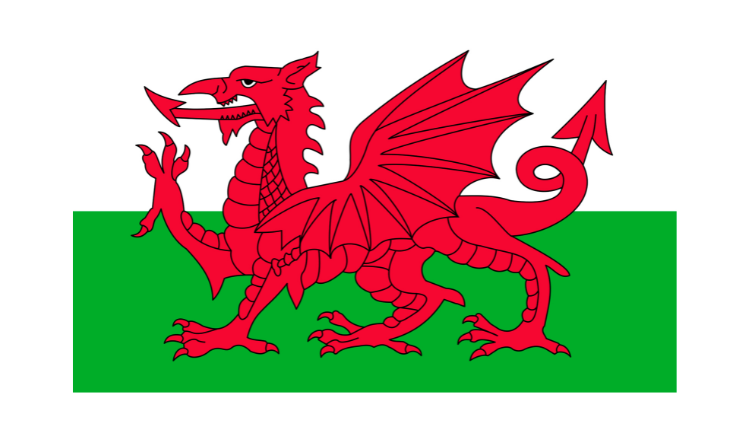All early years providers in England must follow the early years foundation stage (EYFS) frameworks.
The EYFS framework:
- sets the standards that all early years providers must meet to ensure that children learn and develop well
- ensures children are kept healthy and safe
- ensures that children have the knowledge and skills they need to start school
Statutory guidance is issued by law. You must follow it unless there is a good reason not to do so.
November 2024 changes
From 1 November the DfE are bringing in changes to give the early years sector (in particular childminders) more flexibility. These changes will see a new type of childminder introduced and give existing childminders and childcare on domestic premises providers more scope in terms of where they spend their time and base their childcare.
The main changes will:
- create a new category of childminder called ‘childminders without domestic premises’. This is for childminders who will work solely from somewhere other than a home, such as a community or village hall
- increase the total number of people (including childminders and assistants) who can work together under a childminder’s registration from 3 to 4
- give you more flexibility to operate outside of your home (or someone else’s) for more of your time. This will remove the requirement that at least 50% of the childcare must be provided in a home
- mean that any childminders who want to work with 4 or more other adults (5+ in total) will need to register as ‘childcare on domestic premises’
Read PACEYs comprehensive guide to the flexibilities for childminders.
These changes bring updates to the Early years foundation stage statutory frameworks with effect from 1 November.
The changes:
- clarify that the ‘Childminder EYFS Framework’ applies to childminders both with, and without, domestic premises.
- confirm that childminders who are registered without domestic premises need to inform parents and carers that they cannot provide any provision from domestic premises (unless they hold a separate domestic premises registration for the specific premises).
- clarify the qualification requirements for staff counting in the level 6 staff:child ratios in early years settings in the ‘EYFS statutory framework for group and school-based providers’.
There are also other minor changes to both frameworks which include clarifications to existing policy, spelling and grammar.
PACEY has guides for each of the childminder and the group and school-based providers versions of the EYFS. These guides detail the exact changes from the current EYFS, the impact these will have on practice and where you can find PACEY resources to support.
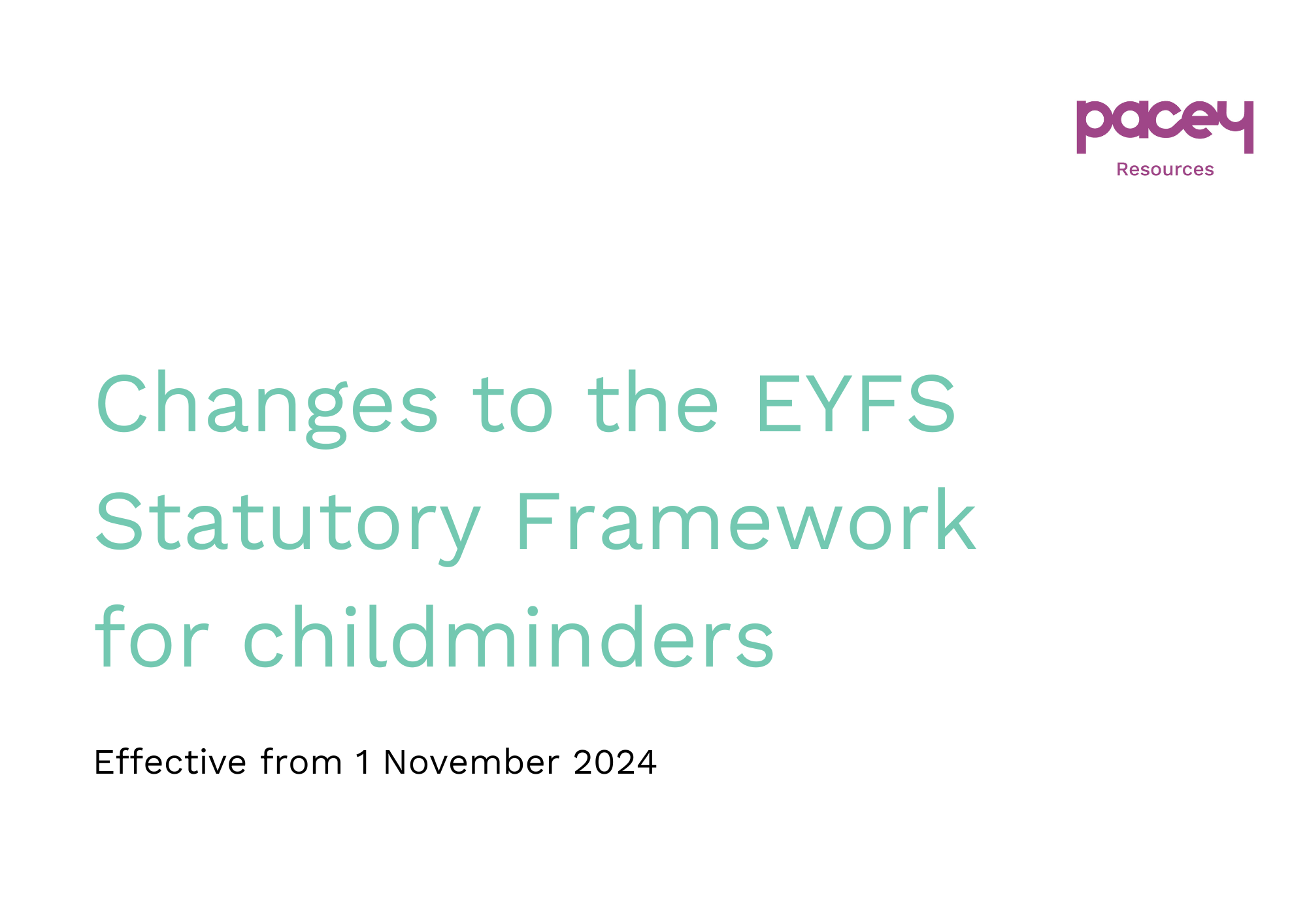
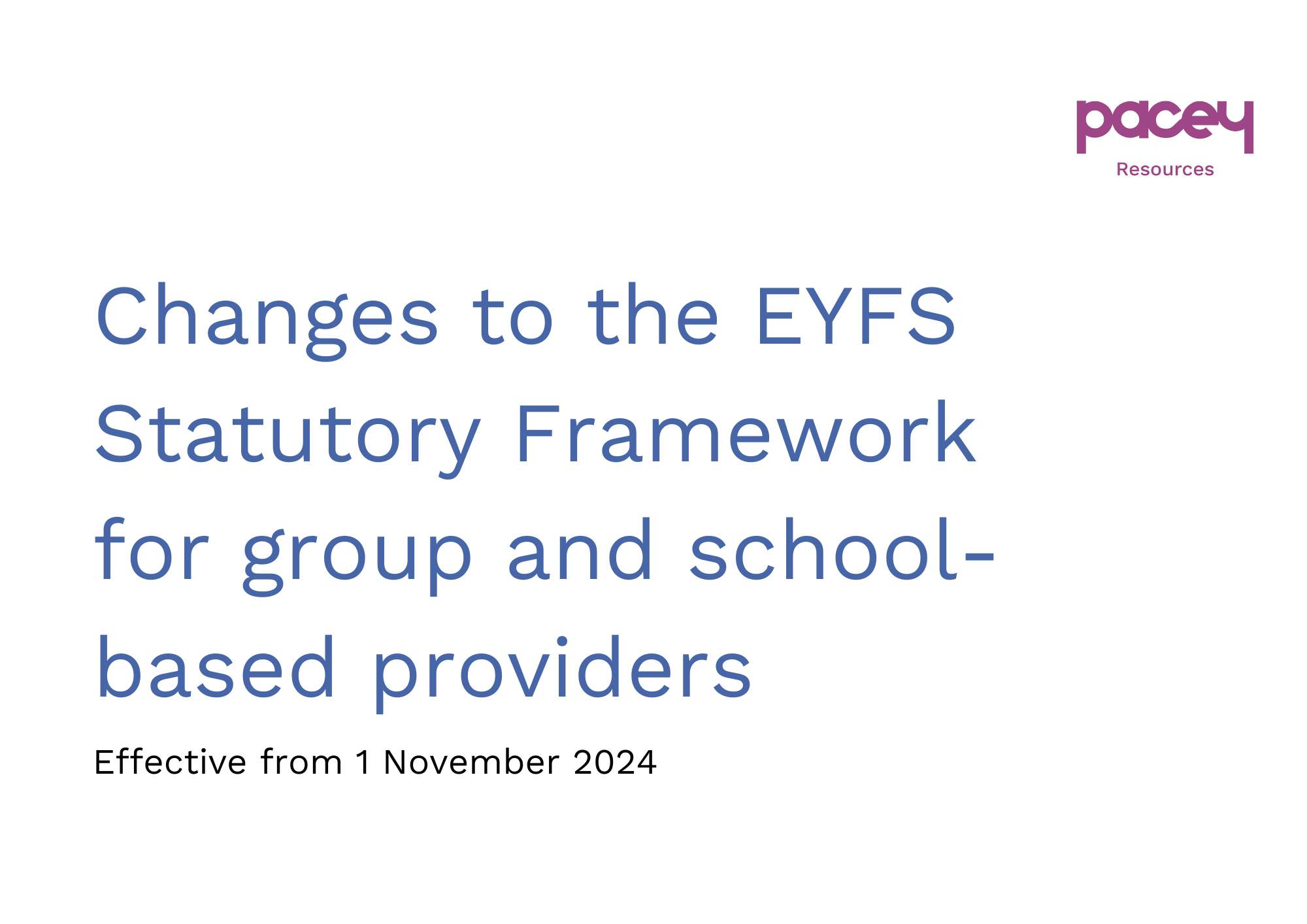
January 2024 changes
The DfE has published two revised frameworks that will replace the current EYFS framework, and these become effective on 4 January 2024.
The 2 new frameworks are:
- EYFS statutory framework for childminders
- EYFS statutory framework for group and school-based providers
Those operating childcare on domestic premises (CoDP), which is where four or more people (either childminders and/or assistants) come together to work in a home-based setting at any one time, should refer to the EYFS framework document for group and school-based providers.
Access the EYFS statutory frameworks here
It is important that you now take the time to familiarise yourself with the new framework that is appropriate to you. You’ll notice that along with the changes that were made as a result of the consultation, the documents are now easier to read with:
- more subheadings throughout both documents
- long paragraphs have been broken down into bullet points
- wording changes to clarify key points
PACEY has guides for each of the childminder and the group and school-based providers versions of the EYFS. These guides detail the exact changes from the current EYFS, the impact these will have on practice and where you can find PACEY resources to support.
*Following further, minor changes to the EYFS statutory framework for childminders made by the DfE on the 19 January -these guides has been updated to reflect these changes. Section 1 shows the most recent changes and section 2 details the changes that were made effective 4 January 2024.*
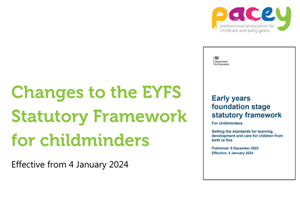
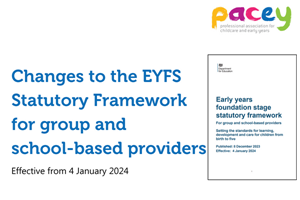
PACEY Live webinar: EYFS Consultation update with PACEY and DfE (England)
Here from PACEY and DfE for a webinar to update our members and other early years practitioners on the proposals in the EYFS consultation.
We were joined by Charlotte Stockton, Early Years Foundation Stage Implementation Team Leader and Sarah Pinder from DfE’s Early Years Policy Team who will be updating on the EYFS consultation and Tom Hodgston, Policy Advisor, Childminder’s Unit, for an update on the childminder start-up grants.
PACEY’s Chief Exec, Helen Donohoe and Head of Membership and Marketing, Ka Lai Brightley-Hodges will also be there to help answer any questions and advise on support from PACEY in relation to the EYFS consultation and our focus for the next year.
Catch up on our webinar on YouTube
September 2023 changes
From 4 July 2022 to 16 September 2022, the Department for Education (DfE) consulted on the following proposed amendments to the Early Years Foundation Stage (EYFS) statutory framework and then laid a Statutory Instrument (SI) in Parliament to amend the Early Years Foundation Stage statutory framework (EYFS) with changes that will come into force from 4 September 2023. These are
- a change to the current statutory minimum staff:child ratios in England for 2-year-olds from 1:4 to 1:5; (For group settings – no change to childminder ratios) (3.33)
- clarifying that childminders can care for more than the currently specified maximum of three young children, when caring for siblings of children they already care for, or when caring for their own child; (3.43)
- clarifying that “adequate supervision” while children are eating means that children must be within sight and hearing of an adult (rather than “sight or hearing”) (3.29)
The ratio changes offer flexibilities to settings, it is important for all providers to ensure any changes they make to staff:child ratios continue to ensure the safety of and meet the needs of all the children in their care.
The clarification that ‘adequate supervision’ while children are eating means that children must be within sight and hearing of an adult. Choking can happen very quickly, and a child who is choking can be silent, therefore visual supervision is essential. Practitioners can find out more about choking prevention and Food safety – Help for early years providers – GOV.UK (education.gov.uk)
Supporting resources
- Development Matters – Non-statutory curriculum guidance for the early years foundation stage.
- Help for early years providers – Get help to improve your practice. Access resources and advice to help improve practice in the early years.
- SEND code of practice: 0 to 25 years – Statutory guidance on the special educational needs and disability (SEND) system for children and young people aged 0 to 25
- A Celebratory Approach to Working with Children with SEND –A guide designed to help practitioners who may be supporting children that require additional help or children with Special Educational Needs and Disabilities.
- What to expect in the Early Years Foundation Stage. Guides parents through what to expect in their child’s development. It aligns with Development Matters to help practitioners engage with parents about their child’s development.
Training from PACEY
Delivering the EYFS online training course
Bright, interactive and colourful, PACEY’s course will bring you right up to date with the requirements of the current Framework, but will also provide you with some suggestions, hints, and tips you can use in your setting to further support the children in your care and their families.
The course is in two parts and after completing a short knowledge check, you’ll be able to download and print your own personalised certificate.
These are the learning outcomes:
- Explore the safeguarding and welfare requirements
- Explore the characteristics of effective learning and how they support children’s development
- Demonstrate how activities support the prime and specific areas of learning
- Define the assessment requirements
- Demonstrate the importance of reflective practice
PACEY members get more
You should have clear policies and procedures in place in accordance with the requirements of the EYFS. PACEY members can use our sample polices templates, available for:
The member exclusive Resource hub is packed full of practice guides, factsheets, webinars and more all developed to support members to deliver the EYFS.
We have a range of other courses covering different topics that support you to power your practice delivering the EYFS:
- An introduction to mathematical development in the early years
- Strategies to support and promote mathematical development
- Understanding and recognising speech language and communication needs in the early years
- Supporting children with Special Educational Needs and Disabilities (SEND)
- Parental conflict; knowing how to support and when to intervene
- and many many more!
- The best for every child
- High quality care
- The curriculum – what we want children to learn
- Pedagogy – helping children to learn
- Assessment – checking what children have learnt
- Self-regulation and executive function
- Partnership with parents
Not a member of PACEY?
PACEY’s always here for you. Our membership helps you power your practice; protects and reassures you, and helps you build and strengthen your early years and childcare community. Join PACEY for everything you need to deliver high quality childcare and early education to the children and families you look after from as little as 40p a day, including insurance.
Trial CEY smart
If you are not a PACEY member yet, you can try a number of CEY smart courses completely free of charge. Discover the following courses as a non-member, then many more when you join PACEY.
- An introduction to mathematical development in the early years
- Inspection and you – Education Inspection Framework Jargon busting
- An introduction to Speech Language and Communication in the Early Years

